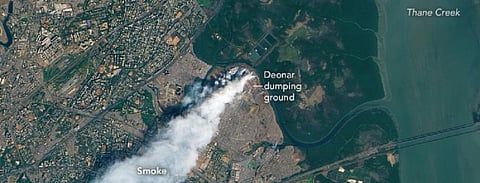BMC ‘rebate for waste’ scheme should divert waste from Mumbai's landfills
The Brihanmumbai Municipal Corporation (BMC) launched a scheme in August 2019 that promised a 15 per cent rebate on property tax if housing societies in Mumbai segregated and processed wet waste in their premises, disposed dry waste and used harvested rainwater and recycled grey water, a top official has said.
“The BMC will give tax rebates to a minimum of 2,000-3,000 societies before March 31, 2020,” Vijay Balamwar, deputy municipal commissioner (Election), told Down To Earth on January 3, 2020.
“Gradually, every society wants to come under environmental-friendly zones and follow more green practices. Hence, the BMC has set a target to reach out to 10,000 societies all over Mumbai by the next year,” Balamwar added.
The tax is used to maintain and support basic civic services such as construction of schools and libraries, repairing roads, improving sanitation, emergency services, transportation, parks and various other recreational activities.
The BMC, which is India’s richest municipal corporation, is responsible for the collection and administration of property tax and maintaining civic amenities in Mumbai, India’s largest city, and its metropolitan area.
BMC follows a capital value-based system for property tax calculation like Pune. It can be computed online on the BMC website by entering ward, zone, locality, area, usage, occupancy type, total carpet area, year of construction, floor type, etc.
The civic authority had, in 2018-19, collected property tax worth Rs 5,082 crore. The BMC has set a target for property tax collection of Rs 5,500 crore for the next financial year, Balamwar said.
“The purpose of the tax rebate scheme is to encourage and strengthen decentralised waste management in the city so that less amount of waste reaches to the landfills and dumping sites. Source reduction and composting, along with other eco-friendly activities, should be the focus in order to manage waste effectively,” Balamwar added.
Under the initiative, there is five per cent rebate for segregating and composting wet waste; five per cent for recycling dry waste through dry recyclers, and five per cent for using rainwater or recycled grey water.
Housing societies following the first criteria will get a five per cent rebate and those meeting all the three criteria will get 15 per cent rebate on property tax. This scheme is applicable to only residential societies.
BMC and waste management
The tax rebate scheme is the latest initiative by the BMC towards managing Mumbai’s burgeoning waste problem.
The BMC’s budget for 2019-20 is Rs 30,692 crore. Of this, it has set aside funds for mega projects including solid waste management (Rs 177 crore) and a waste-to-energy plant at Deonar (Rs 100 crore).
In order to propagate the message of waste segregation, separation of wet and dry waste, and punishment of repeat offenders, the BMC issued an order in September 2019, that empowered the office bearers of all housing societies / complexes to issue notices to those households / apartments that do not consistently segregate waste as mandated under Solid Waste Management Rules, 2016.
The scheme’s implementation has begun, with officials from the solid waste department holding meetings with residents to inform them about the initiative, said Balamwar. He stressed that concessions had already been given to some societies, for which he was hesitant to share the exact number of households covered till now.
Malabar Hill society, that processes up to 75 kilogram wet waste daily and uses the produce as manure for gardens, was awarded the rebate after inspection by a panel. The society is likely to get 10 per cent additional rebate upon completion of requisite norms.
Future aspects of this scheme
- It is an economic incentive instrument that may act as catalyst for the management and streamlining of waste(s) at the source;
- It is an economic instrument that offers significant relaxation to producers and consumers which helps in reducing the cost of achieving desired environmental goals and addresses important measures like fiscal and environmental costs of garbage;
- It offers a flexible strategy to allocate and use market mechanisms for waste collection and disposal among residents, collectors, processors and other key stakeholders;
- It helps communities to reduce waste by volume, increases diversion of organic wastes, create environmental consciousness and encourages greater recycling.
- According to the estimates of the Central Pollution Control Board, Mumbai generates about 11,000 tonnes per day of solid waste, making it one of the top waste-generating metropolitan cities of the country. The dumping sites of Mumbai, where waste is dumped unscientifically, are ticking time bombs and hence this scheme of segregation of waste and processing at source will help in diverting the waste from landfills significantly.
With the expanding population of Mumbai, estimated at 20 million by 2020 according to the latest revision of the UN World Urbanization Prospects, the waste generation by the citizens has also increased enormously. Hence, this scheme, being confined to residential societies, should also be replicated to other kinds of settlements including commercial zones, slums, non-residential areas etc so as to attain sustainable waste management in the city.


